Turnip's
Turned Up Bill
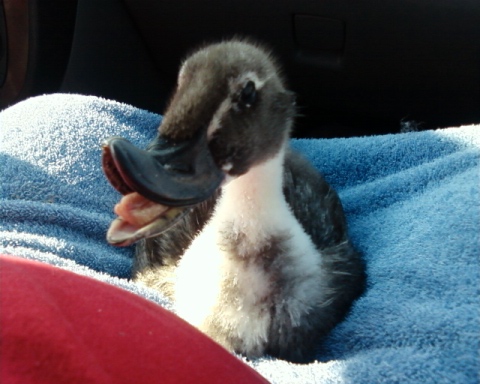
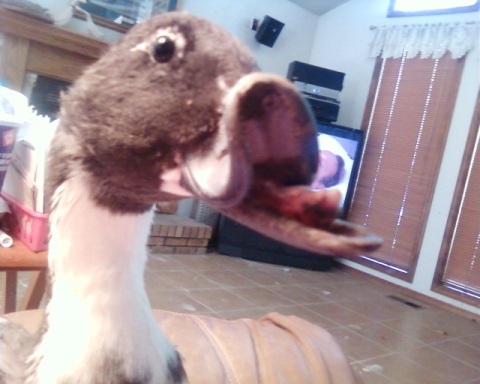
Turnip's Momma contacted us after
adopting this guy from the Ruth Melichar Bird Center
in Idaho where she and her sister volunteer. Turnip was only
a duckling when he was put in a bucket that he could not get
out of and left near a lake.
Christine has learned a few care tips
that she wanted to share with other families who have ducks
with similar needs. Her vet advised her to use unscented
Vitamin A & D diaper rash ointment on his tongue to keep it
from drying out and it is working very well. She had also
tried Chapstick and Vaseline, but found the ointment worked
best and stayed on the longest.

One of the worst parts about Turnip's bill is that it closes off
his nostrils. He has had to learn to breath through his
mouth, which is not so easy for ducks to do. She took Turnip
to the vet to see if his bill could be fixed but it could
not be done. Still, Turnip does very well and is a happy
duck.
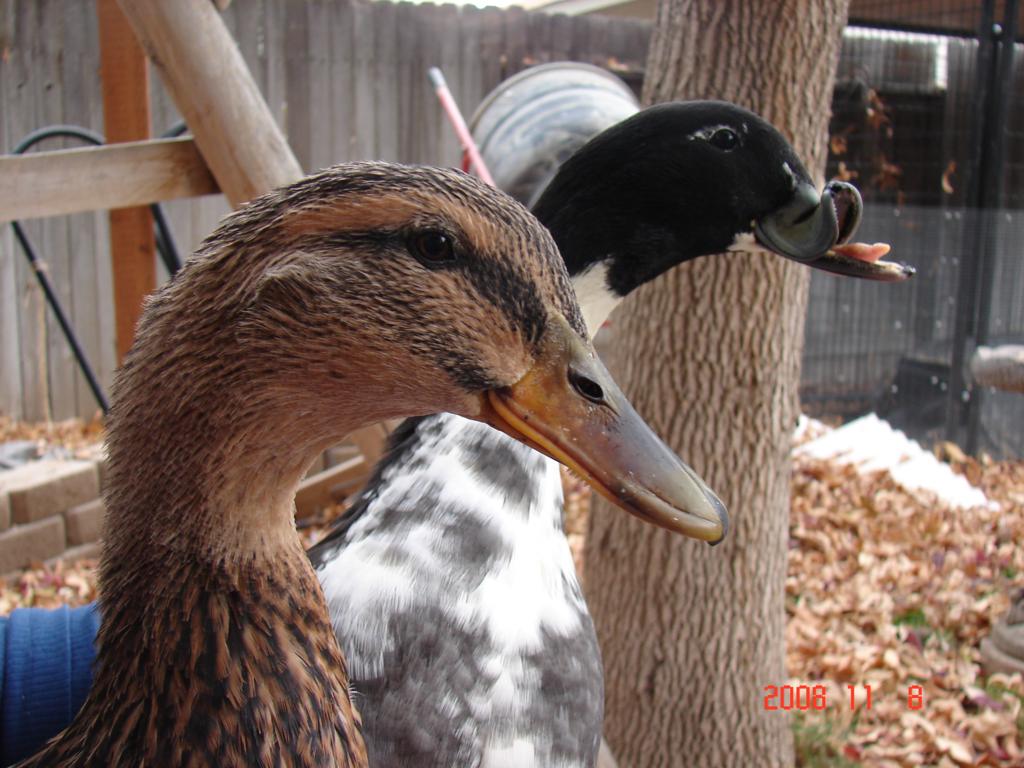
Thank you for contacting us, Christine & Turnip!
Deepest
Sympathies For Nosiey...
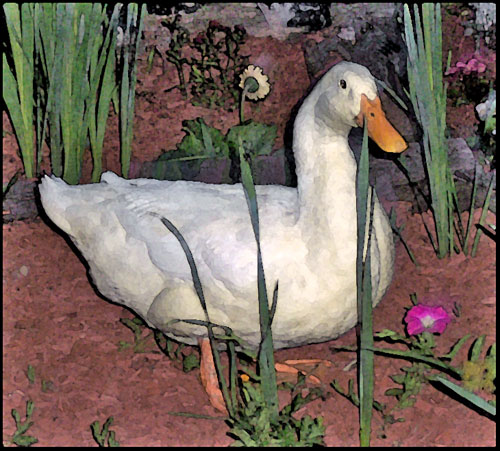
Our condolences to Diane who recently
lost her boy Nosiey just before his 7th birthday. A devoted
bed warmer, Nosiey has spent the last 6 years cuddling up
with his Momma Duck. We were so sorry to hear about this guy
and our thoughts are with you during this trying time.
Hathaway School
Thank you to the students of
Hathaway School for participating in the
Lemon the Duck book sale fundraiser! We are so
grateful for your generous donation. Special
thanks to Patrick Heaps for your thoughtful letter.
Special thanks to Author Laura
Backman (Lemon's Momma Duck!) for sharing a portion of the
proceeds from her wonderful children's book to Majestic
Waterfowl Sanctuary. And of course a special shout-out to Lemon! QUACK!
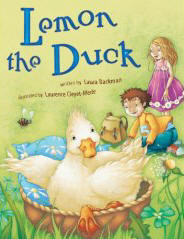
If you have not yet purchased this
wonderful book, you are really missing out! Click
here
to order from Amazon, or click here to order directly
from the publisher,
Lobster Press. Click here to
learn more about
Lemon.
Preventing Abandonment at a Local Level
We would like to extend a special
thank you to the residents of Coventry, CT who
noticed Domino the duck trying to survive on Coventry
Lake. Not only did these residents volunteer their
jetski and participate in the rescue of this Blue Swede/Pekin
duck, but they also figured out exactly how he ended up
abandoned on their town lake.
Domino was hatched out in one of
Coventry's schools, and residents were able to provide
Majestic with detailed information regarding his
abandonment right down to the teacher's name who hatched
him.
We are pleased to announce that
upon writing the school's Principal, Superintendant, Science teacher,
Science Chair and their local Animal Control
Officer, we and Coventry residents have been assured
by the school that this will not happen again.
This is a good example of how a few
people can make a real difference in the humane
treatment of animals for years to come. If
classroom hatchings are happening at your local school,
it's up to you to step up to the plate and do
something about it.
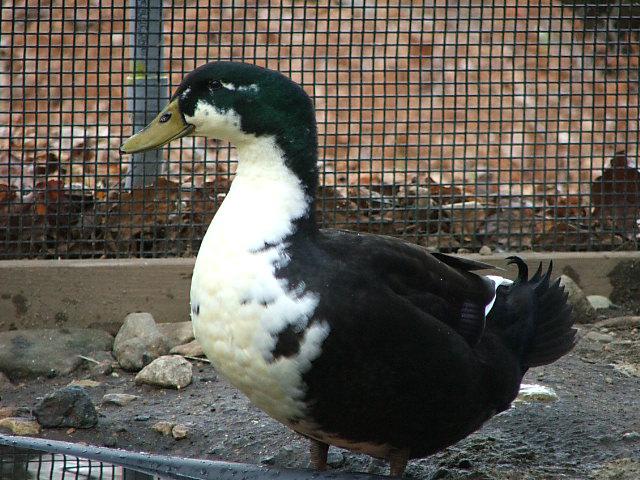
Domino now enjoys a life of leisure
while he awaits his new home.
A Sample Letter Against School Hatch Projects
Not sure how to
compose a letter to address similar issues at your
own school?
Here's a template to give you a few ideas:
Dear
(Principal's name),
I am
contacting you after being enlightened about an animal
welfare issue that is taking place at (name of school). It has
come to my attention that ducklings were hatched out (this Spring) at this school in the
classroom of (name of teacher).
School
hatching projects commonly have five negative outcomes:
1.
Inexperienced teachers utilize improper or imperfect
hatching techniques and hatch out a duckling with severe
health issues and then
are unwilling or unable to provide for them properly.
2.
Inexperienced teachers raise ducklings in their classroom on
inadequate diets rather than feeding them specialized
waterfowl food, which results in severe cases of
malnutrition.
3. Ducklings
fall into the random hands of unprepared and uninformed
children and their families who have no idea how to properly
feed, care and protect them from a wide array of predators.
4.
Ducklings are brought to one of the few shelters that are
actually equipped to take them. In which case, your
teacher is actually participating in an irresponsible cycle
that adds yet more animals to shelters that are already brimming
with unwanted pets.
5.
Ducklings are thoughtlessly discarded onto public ponds and
parks and expected to survive there without intervention.
As with other pets, domestic waterfowl
cannot survive in the wild. They cannot fly and they are
totally reliant upon human care and protection. They are
defenseless against predatory attacks, vulnerable to the
elements and they are prone to serious injury, acts of
cruelty and starvation. Most of them never survive their
first winter.
Releasing
domestic birds onto public property is irresponsible (often
illegal) and
unacceptable as we are sure your local Animal Control
Officer will agree. Furthermore, if these ducks mate with
wild ducks, their offspring are often flightless as well and
also unable to migrate. In warmer climates, this can
actually result in non-flying population explosions that can cause
pond erosion and water pollution issues.
Pet
neglect and abandonment is not only inhumane, but it also sends children
a powerful and negative message about the disposability of
pets.
Classroom hatching projects are not necessary to teach
children about development cycles. We urge schools to take
the recommendation of the National Humane Society and use
alternatives such as picture books, models, videos and
classroom drawing activities in lieu of hatching programs.
Some ideas can be found at the following website:
http://www.upc-online.org/hatching
We thank
you in advance for doing everything possible to prevent this
type of animal neglect and cruelty in the future, and we
look forward to your prompt response.
Sincerely,
(your
name & contact info)
cc.
Principal
Superintendent
Teacher
Science
Chair Person
Animal
Control Officer

